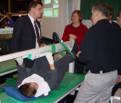Individual risk factors of stroke:
Each risk factor constitutes a danger in itself. If several of them combine, the risk further increases.
High Blood Pressure
Constant high blood pressure puts a mechanic strain on the arteries, which they cannot cope with. Nowadays, high blood pressure is probably considered the biggest risk factor for arteriosclerosis and apoplectic stroke. By normalizing blood pressure the risk can therefore be significantly reduced.
Nicotine
Scientific studies clearly show that smoking heightens the risk of an apoplexy. Nicotine is poison for the blood vessels.
Heightened Cholesterol Levels
Cholesterol constitutes a natural and important component of our body. Heightened fats levels signify an increased risk of an apoplectic stroke. Conscious nutrition and regular exercise can prevent this problem.
Diabetes mellitus
Diabetes also favors apoplectic strokes. Blood sugar levels therefore have to be correctly maintained. Regular exercise on the GIGER MDâ Therapy Instrument can significantly improve sugar levels.
Extensive Consumption of Alcohol
Moderate consumption of alcohol may possibly have a protective effect, especially a glass of red wine daily. But extensive alcohol consumption has the opposite effect.
Aneurysma
Apoplectic strokes caused by hemorrhages can also be the result of so- called aneurysms. This kind of deformation is generally hereditary. Aneurysms are small, rounded, mostly saccular protuberances of the vascular wall. They preferably develop in the area of the vascular corona of the basal skull. This deformation inevitably constitutes the risk of a tear, as the vascular wall overstretched in the area of an aneurysmal sac is thin and pliable. A sudden increase of overall blood pressure, for instance through strain, results in the bursting of the sac, which in turn leads to the arterial blood seeping into the meninges and the cerebral tissue. The bursting of a cerebral aneurysm is a very dramatic, violent event with possibly life-threatening consequences.
Arteriolosclerosis, high blood pressure, cerebral embolism, inflammatory vascular disorders and aneurysms are all disorders that take place in the arterial vascular system and can therefore trigger the stroke.
Stress
In a condition of stress we put our body under extreme pressure. Nature originally provided for this pressure to be released again – through physical exercise. Today, we are using this valve far too little. This can favor the development of arteriolosclerosis.
Lack of Exercise
Regular physical activity can reduce the risk of an apoplectic stroke.
Overweight
In itself, overweight may not be a prime cause of apoplectic stroke. However, it often combines with high blood pressure, heightened cholesterol levels or diabetes.
Cerebral Growths, Viral Encephalitis, Brain Abscess
Occasionally, an apoplexy is diagnosed without a previous basic disorder of the vascular system.
Thus in the case of growths in the brain hemorrhages can occur in the tumor area. Similarly acute events can be observed in the case of a viral infection of the brain, that is, viral encephalitis or a brain abscess with festering colliquation.
Heart Diseases
Certain heart diseases such as a coronary or cardiac arrhythmias can also constitute a heightened risk of apoplectic stroke. If the heart has been damaged through infarction or has become arrhythmic, blood clots can build within the heart. If these are transported by the blood stream to the brain where they occlude a blood vessel, an apoplectic stroke occurs. This event is also referred to as an „embolism".
The Pill
The contraceptive pill increases the risk of apoplectic stroke. Especially at risk are women who also smoke, are overweight or suffer from migraine.
Last update: October 28, 2007
Los Angeles,
California
Los Angeles,
California
Los Angeles,
California
Orlando,
Florida
Phoenix,
Arizona
San Francisco,
California
New York
Atlanta, Giorgia








